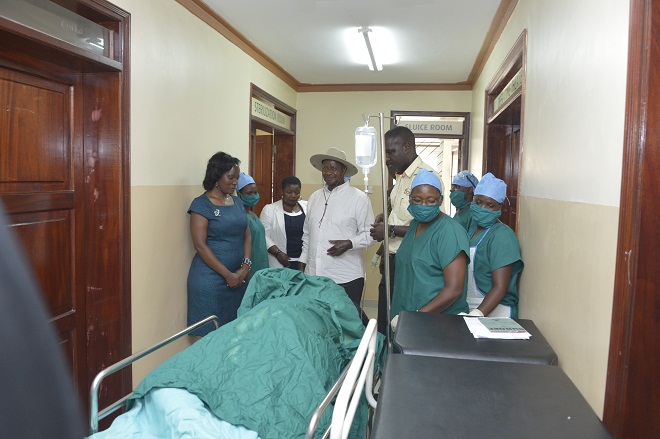
In fact, instead of increasing salaries and wages of its public servants, it appears the government is cutting them as a proportion of the budget. In the 2007/8 FY, for example, the budget was Shs3 trillion but wages and salaries of public servants took Shs1.1 trillion of that or 36% of the budget. On the other hand, in the FY2017/18 with a budget of Shs30 trillion, salaries and wages take up Shs3.5 trillion or just 11% of the budget.
Meanwhile, most of the money that funds the health sector comes from donors. The U.S. which is the biggest provider to the health contributed US$488.3million last year to cater for various health activities. In the FY2017/18 health sector budget declined further by 37% from that of 2016/17. The Health budget as a percentage of budget has steadily declined from 9.6% of the total budget in 2009/10 to 8.7% in 2013/14 and further to 7% in the current financial year 2017/18. In other words, although the volume of money given to the Health sector, including salaries and wages, has gone up over the years, most of it has gone pay a bigger army of workers as the population expands and medical facilities and service delivery expand. The increased expenditure has also gone to pay high salaries and allowance to a few individuals and departments. That is why doctors say the government has money, what it lacks are clear priorities.
Experts like Sarah Nahalamba, a Social Sector planner with the National Planning Authority say the current strike speaks of volumes about government priorities. She says even without budget increases, the grievances of doctors which to her are valid, can be solved. She says the government needs to rationalise its resources to ensure that the greatest impact is made.
She says the government needs to harness this human resource because “it is a critical batch that can transform or degenerate society”.
“The population will not be productive if they are not in good health,” she says, “The doctors need to be well remunerated for them to be motivated to work. What is happening affects the whole system not just the treatment part.”
With such small budgets available, Nahalamba says the government should negotiate with the doctors since worldwide medicine; because of technicalities in training and nature of work as a full time engagement, commands a commensurate pay. A simple search on the internet will show you that globally medicine is rated the highest paying job with physicians in the U.S. for instance earning a median base salary of $180,000.
Human Rights lawyer Nicholas Opiyo says the Ministry of Health has focused on non-issues like questioning the legality of the striking association. He says this is an attempt to intimidate and blackmail UMA members.
“The medical association doesn’t require recognition of the state but rather the state is compelled by law to engage with it as it has been doing in a couple of months,” Opio told The Independent, “the strike forms part of the basic civil liberties whose respect is essential for meaningful exercise of workers’ union rights.”
Musa Mayanja Lwanga, a Research and Policy Analyst at the Economic Policy Research Center, says there is need to review the public sector salary structure to make it comparable with that of the private sector. What makes doctors want an increase, he says, is that the cost of living especially in urban areas has been steadily rising over years, which has put a strain on workers whose salaries have not followed suit.
He also recommends a review to ascertain the optimal number of civil servants and ensure that the right people with the right qualifications and competences are serving in the right places.
 The Independent Uganda: You get the Truth we Pay the Price
The Independent Uganda: You get the Truth we Pay the Price





